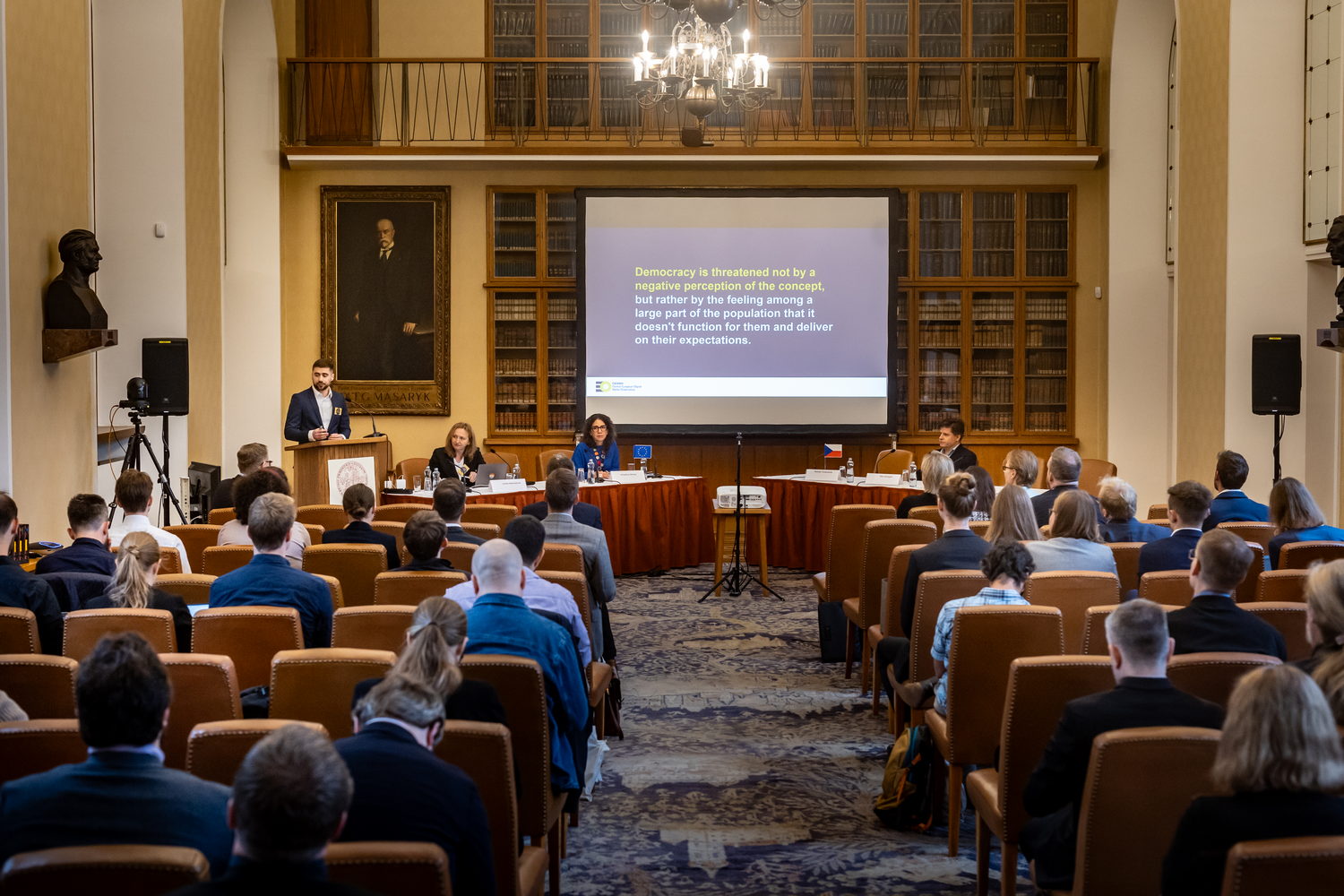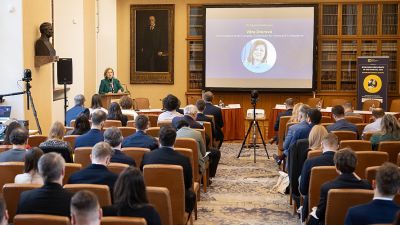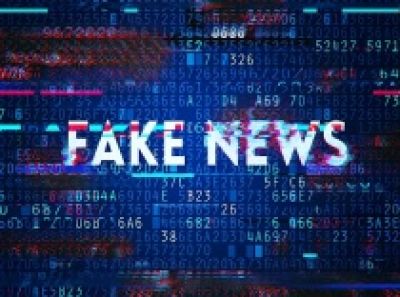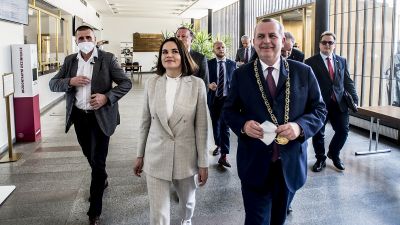On Tuesday 23 September, Charles University once again hosted the annual Central European Digital Media Observatory (CEDMO) conference, bringing together researchers, investigative journalists, policymakers, political analysts, fact-checkers, and other professionals dedicated to analysing digital transformation, information sources and propagation – and disinformation. This partnership between Poland, Slovakia, and the Czech Republic, supported by the European Commission and part of the interdisciplinary EDMO network, is committed to cultivating a culture of research, fact-checking, media literacy, and upholding democratic processes.
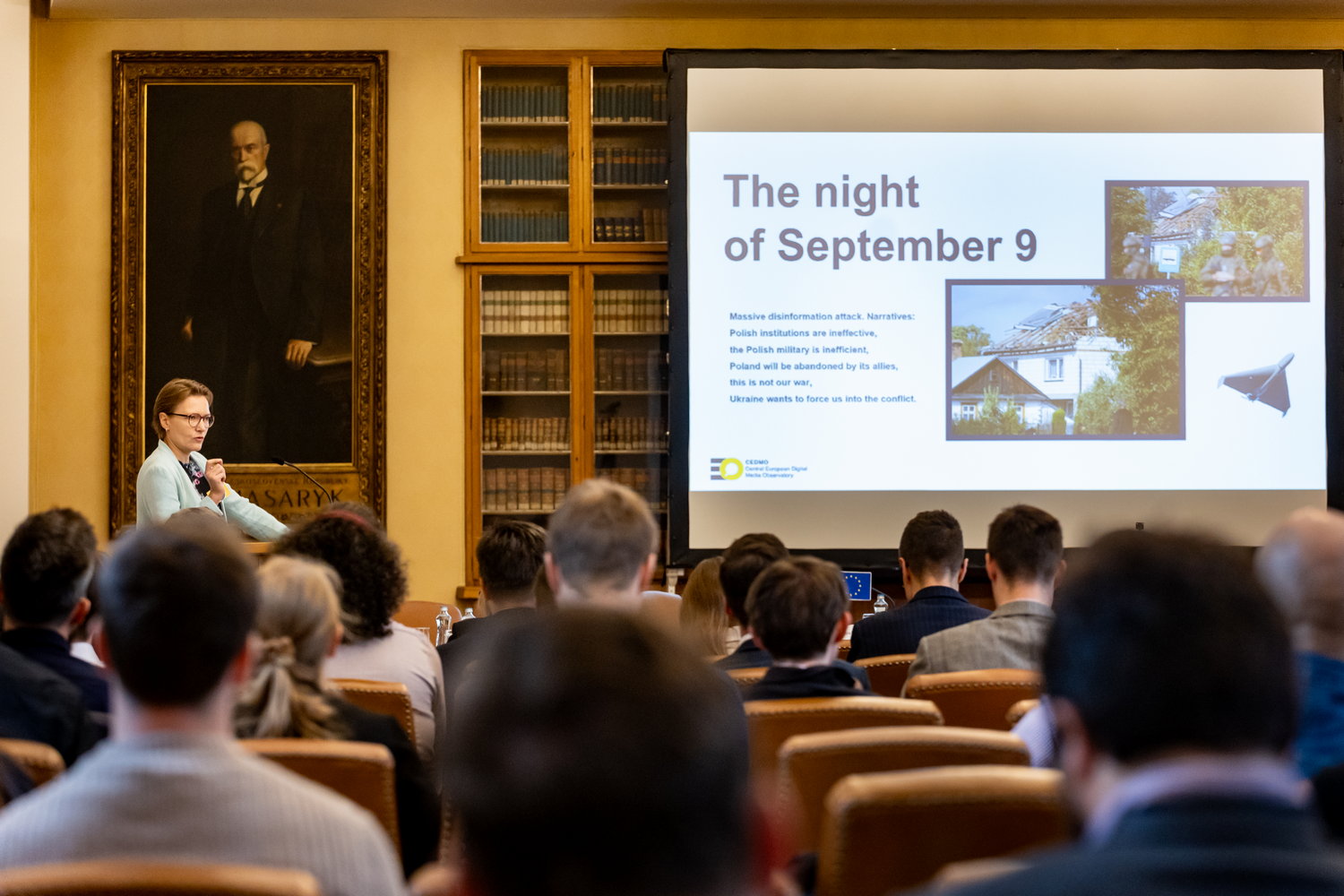
Deputy editor-in-chief of Gazeta Wyborcza Aleksandra Sobczak unravels the current disinformation narratives in Poland.
The conference, titled Brewing Resilience Against Disinformation, offered insights from the recent CEDMO Trends longitudinal research in the Czech Republic and Slovakia, discussions on fact-checking initiatives and AI-powered tools for detecting disinformation and deepfakes, and panels dedicated to biomedical disinformation and its societal impact, as well as foreign interference in elections across Central Europe (see the full programme online). In addition, the conference, with its focus on disinformation in Central Europe and election integrity, was very timely: the Czech Republic is in the final stretch of the campaign before important parliamentary elections (held on 3 and 4 October).
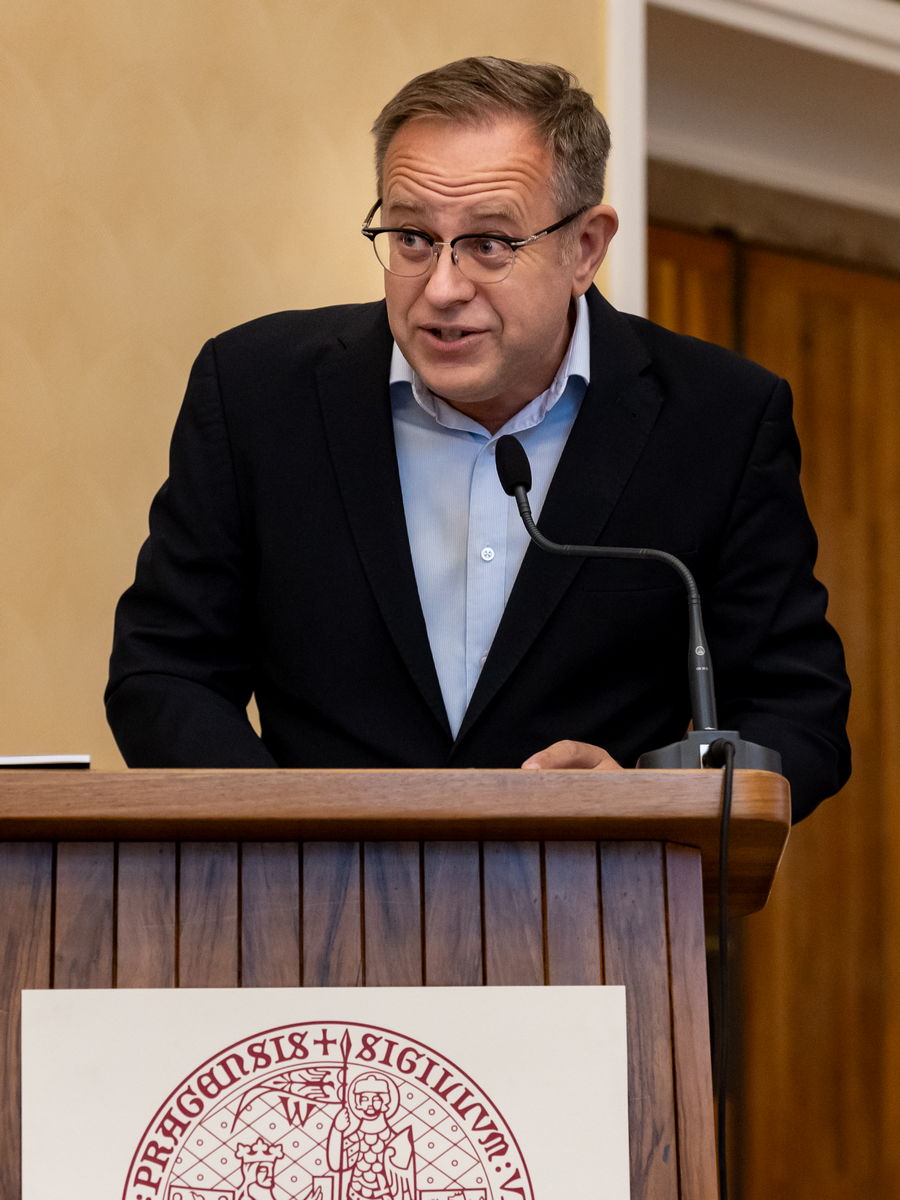 One of the key words of this meeting was “trust”. Moderator Lenka Kabrhelová, in her opening speech, noted that “around the world, we are witnessing how deliberate spread of falsehoods undermines trust in institutions, how it polarises societies, communities, and how it threatens the integrity of democratic processes.”
One of the key words of this meeting was “trust”. Moderator Lenka Kabrhelová, in her opening speech, noted that “around the world, we are witnessing how deliberate spread of falsehoods undermines trust in institutions, how it polarises societies, communities, and how it threatens the integrity of democratic processes.”
Václav Moravec, main coordinator and chair of CEDMO’s consortium strategic board as well as leading Czech journalist, also pointed out the word “trust” – and mentioned how the spread of misinformation contributes to a society of mistrust. People are losing faith in the election process and scientific knowledge, but also photographs and videos, due to the rampant AI boom. “The aim of CEDMO’s activities is to prevent the deepening of a society of mistrust,” he said. Moravec added that the Observatory website has become a sort of “virtual café” (hence the conference’s title) – and indeed, here in Charles University’s Patriotic Hall on Monday, many of its virtual guests gathered in person.
CU Rectress Milena Králíčková followed with the attestation that both Charles University throughout its long history as well as CEDMO has stood at the side of truth and the ceaseless search for truth. Herself a medical expert, she also voiced a deep concern over the recent development in the United States such as questioning scientific methods or the ongoing fight against vaccination. This not only directly affects her colleagues overseas, but also has an impact on general medical care in the US and other countries. And hers was but one of many such examples in various fields that the diverse academic community participating in CEDMO activities follows and analyses. In fighting disinformation, upholding databased science and academic discussion, she stated, “we are not going to step back”.
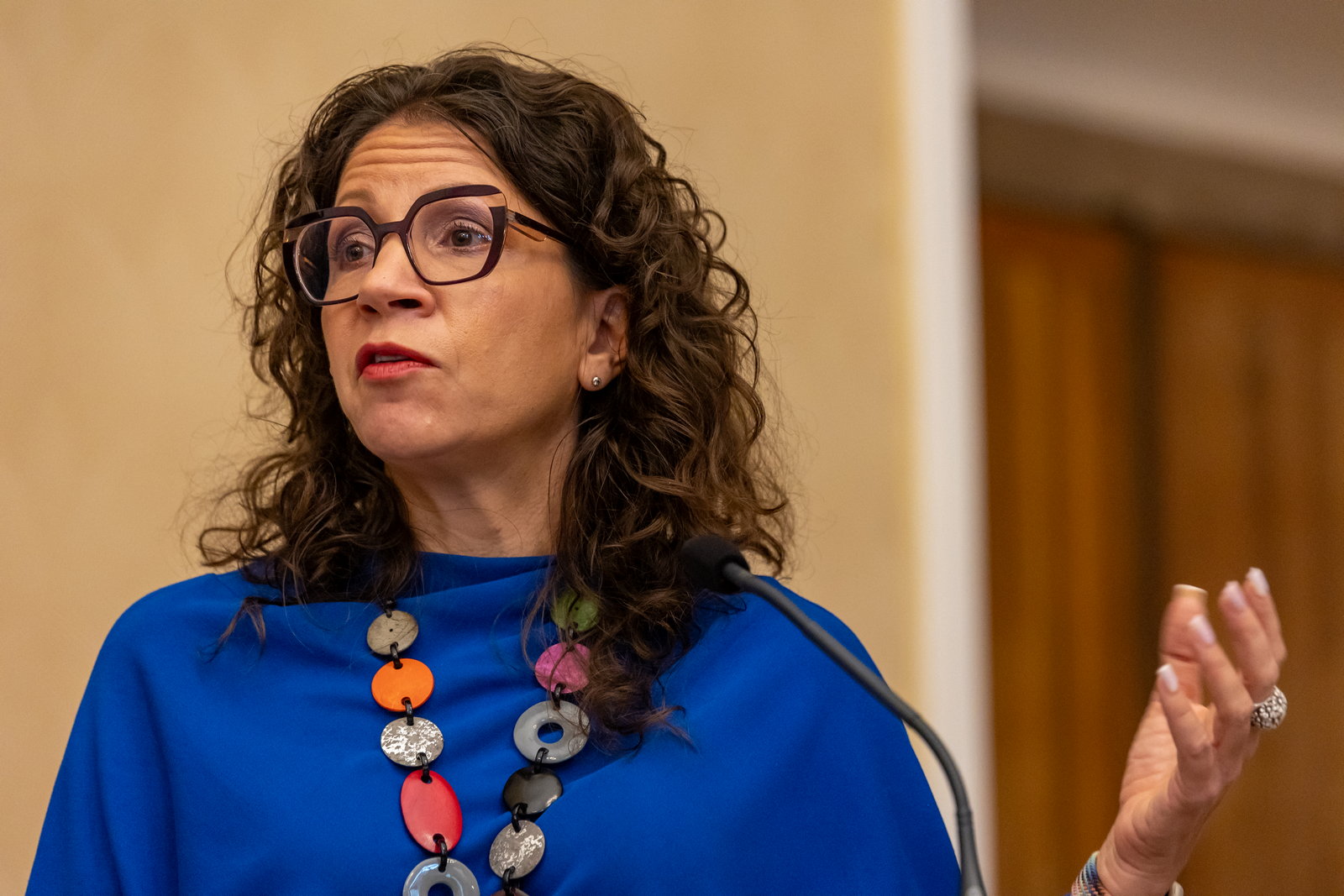 At the European Commission, Krisztina Stump helped conceive the Code of Conduct under the Digital Services Act.
At the European Commission, Krisztina Stump helped conceive the Code of Conduct under the Digital Services Act.
Following on, Krisztina Stump, in charge of social media policy at the European Commission, warned that there is no one “silver bullet” to vanquish misinformation; the effort actually comprises various elements and individual contributions by the people engaged in this fight. These of course include the EDMO hubs, now covering nearly all of Europe, with a brand-new FACT hub focusing on Romania, Moldova, Ukraine, and the Baltic states.
Misinformation has actually been declared the #1 short-term threat to democracy, not only due to the rise of social media as main source of information. So, how is EU approaching disinformation? Krisztina Stump spoke about EU’s regulatory framework including the Digital Services Act – which, among other, for the very first time imposes risk-mitigation obligation on digital platforms. One of the ways to implement this might be the development of a more robust code of conduct, enforced by the platforms themselves.
Later, in her own panel speech, she spoke more deeply on the topic of election integrity initiatives. There is, she said, a commitment to establish a rapid-response system for elections, where fact-checkers and civil society organisations can flag time-sensitive content that may pose a risk to election integrity, for quicker reaction at times where every hour counts – such as the last days of an election campaign.
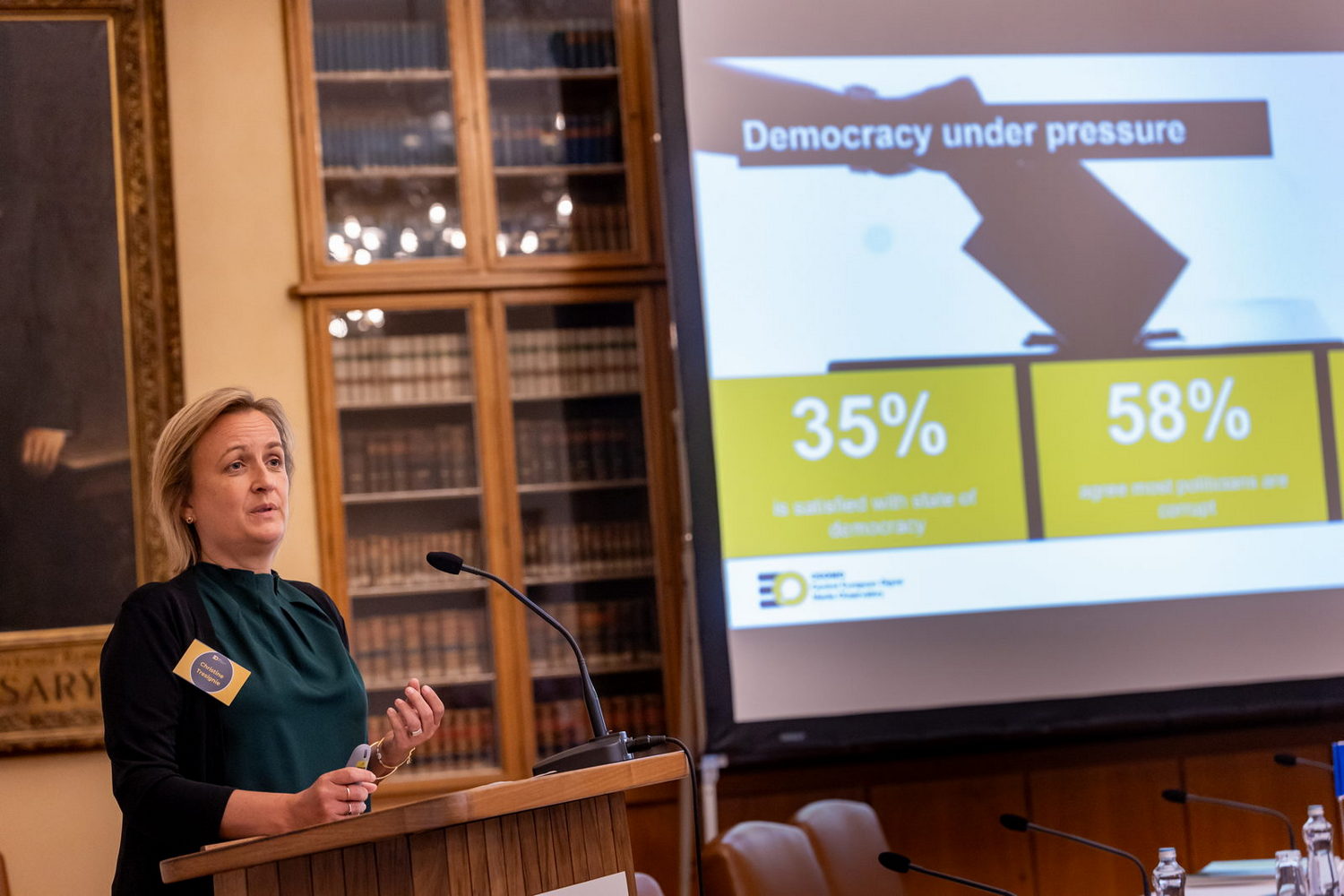 Christine Tresignie agreed that democracy itself is widely accepted, but its current effectivity and credibility increasingly comes into question.
Christine Tresignie agreed that democracy itself is widely accepted, but its current effectivity and credibility increasingly comes into question.
Managing Director at Ipsos European Public Affairs Christine Tresignie summarised the key findings of recent Ipsos surveys across Europe. These show that only 35 % of people say they are satisfied with the current state of democracy. Six out of ten believe that politicians are corrupt, and the same majority feels that elections don’t really change anything. Of course, it is not the concept of democracy itself, but its current effectiveness and integrity that is doubted. This resulting mistrust is then fertile ground for disinformation and polarisation of society. And while disinformation is practically everywhere, seven out of ten youths claim they can recognize misinformation. But is it actually true – can they in fact reliably discern false narratives? While this particular result may sound encouraging, Christine Tresignie was rather reserved in her judgment, admitting it is rather worrying – and that such belief may pose another potential threat.
Aleksandra Sobczak, deputy editor-in-chief of major Polish newspaper Gazeta Wyborcza, then offered a bit of Polish perspective of recent events in the country and abroad, touching on some of the characteristic movements there and some of the pressure fuelled by Russian secret services, including recruiting Polish people for Internet trolling as well as direct sabotage such as arson. She outlined how the “Russian model” of spreading misinformation effectively synergizes with the way digital platforms’ algorithms, adjusted primarily to help them earn money, are set up. Today’s addictive culture of endless social media feed scrolling then only “helps” in this regard. Just like the previous speakers, Aleksandra Sobczak also called for regulation, drawing a potent comparison – “We can’t have toxic food, so how come we can have toxic algorithms?”
But of course, this is easier said than done. As the coordinator of the fact-checking project Demagog.cz Petr Gongala pointed out, “we cannot rely on for-profit corporations to do the right thing themselves.” We do need regulatory action, including security measures for fact-checkers working with the platforms, but also the freedom of speech. In rebuttal of a widespread argument, Gongala asserted that fact-checking doesn’t in any way hinder free speech. Fact-checkers don’t want to ban misinformation itself or pursue legal retribution – they, above all, strive to advance the culture and actual practice of free speech. However, they can’t act before people are actually exposed to misinformation. Then, of course, subsequent fact-checking is often seen as an attack on free speech – or, at least, freedom of opinion. So, every move is very difficult, and as of right now, fact-checkers have very little impact in the grand scheme of things.
Ultimately, the takeaway from these contributions, as well as the various subsequent panels seems to be: there is hope. The fight is not nearly over yet – if indeed it ever can be – but there is motion to stay vigilant as well as enact clear legislation. All with the goal not only to fight misinformation, but most importantly to improve the lives of all citizens.
